牛津英语7B Unit5 九年级复习教学案
- 格式:doc
- 大小:110.00 KB
- 文档页数:14
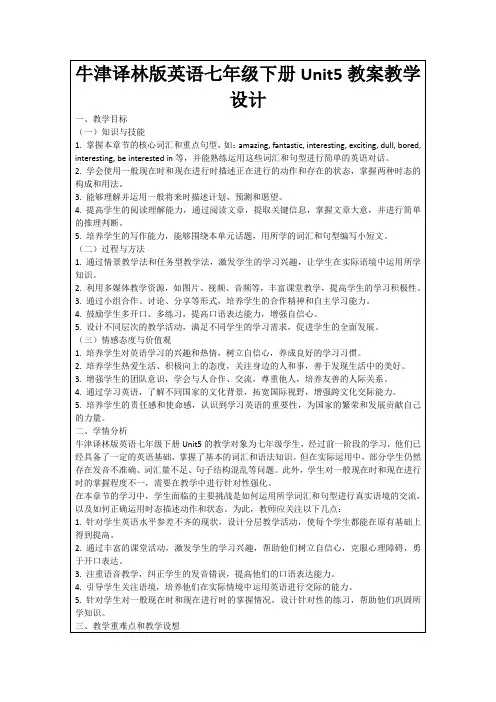
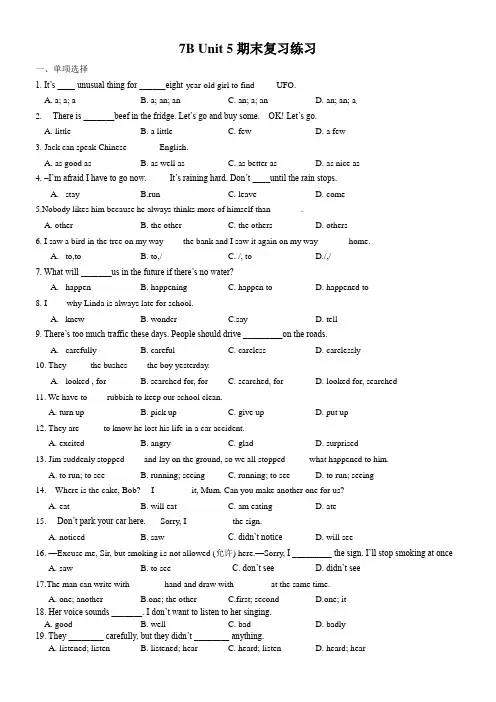
7B Unit 5期末复习练习一、单项选择1. It’s ____ unusual thing for ______eight-year-old girl to find ____ UFO.A. a; a; aB. a; an; anC. an; a; anD. an; an; a2. ---There is _______beef in the fridge. Let’s go and buy some.---OK! Let’s go.A. littleB. a littleC. fewD. a few3. Jack can speak Chinese _______English.A. as good asB. as well asC. as better asD. as nice as4. –I’m afraid I have to go now.--It’s raining hard. Don’t ____until the rain stops.A.stayB.runC. leaveD. come5.Nobody likes him because he always thinks more of himself than_______.A. otherB. the otherC. the othersD. others6. I saw a bird in the tree on my way ____the bank and I saw it again on my way_______home.A.to,toB. to,/C. /, toD./,/7. What will _______us in the future if there’s no water?A.happenB. happeningC. happen toD. happened to8. I ____why Linda is always late for school.A.knewB. wonderC.sayD. tell9. There’s too much traffic these days. People should drive _________on the roads.A.carefullyB. carefulC. carelessD. carelessly10. They _____the bushes ____the boy yesterday.A.looked , forB. searched for, forC. searched, forD. looked for, searched11. We have to ____rubbish to keep our school clean.A. turn upB. pick upC. give upD. put up12. They are _____to know he lost his life in a car accident.A. excitedB. angryC. gladD. surprised13. Jim suddenly stopped ____and lay on the ground, so we all stopped _____what happened to him.A. to run; to seeB. running; seeingC. running; to seeD. to run; seeing14.---Where is the cake, Bob?--- I ________it, Mum. Can you make another one for us?A. eatB. will eatC. am eatingD. ate15. ---Don’t park your car here.--Sorry, I __________the sign.A. noticedB. sawC. didn’t noticeD. will see16. —Excuse me, Sir, but smoking i s not allowed (允许) here.—Sorry, I _________ the sign. I’ll stop smoking at onceA. sawB. to seeC. don’t seeD. didn’t see17.The man can write with________hand and draw with ________at the same time.A. one; anotherB.one; the otherC.first; secondD.one; it18. Her voice sounds _______. I don’t want to listen to her singing.A. goodB. wellC. badD. badly19. They ________ carefully, but they didn’t ________ anything.A. listened; listenB. listened; hearC. heard; listenD. heard; hear20. -- Jack, is maths difficult to learn in high school? -- Sure. No one can learn every subject well _____ hard work.A. withoutB. throughC. by D with21. --Could I have a talk with you, Bruce? ---Sure. But only ____time.A. a littleB. a fewC. littleD. few22.—When _______you return the magazine? –Three days______.A. will; agoB. did; agoC. will; moreD. did; before23.He went______yesterday and ______some apples.A. shopping; boughtB. shopped; boughtC. shop; boughtD. shopping; buy24.--How was your day off?-- Pretty good! I _______the Science Museum with my classmates.A. visitB. visitedC. am visitingD. will visit25. The pronunciation of "ed" in_______ is different from the other three.A helped B. played C. talked D. passed26.A true friend will never _______from you when you’re in trouble.A. take awayB. run awayC. put offD. get off27.He told us about the _________ news in a _______ voice.A. amazing; surprisingB. amazed; surprisedC. amazing; surprisedD. amazed; surprising28.The boy wasn’t listening _______ in class ,so he often missed something important.A. enough carefulB. careful carefulC. carefully enoughD. enough carefully29.—Is ________ ready for the trip?—No, we still need to buy a map before we start the trip.A. anythingB. somethingC. everythingD. nothing30.Look, there is UFO and air plane flying in the sky.A. a; aB. an; anC. a; anD. an; a31.Amy gets up early now. She is ______late for school ______.A. no; any moreB. not; any moreC. any; no moreD. any; not more32.Thank you so much. I can’t finish the task your help.A. withB. withoutC. inD. at33.— The exam is very easy. —Yes, but I don’t think can pass it.A. everybodyB. anybodyC. somebodyD. Nobody34. — Why do you keep all the windows ______?—Oh, it’s too hot inside today. I just want the wind to blow in.A. openB. openedC. closedD. closing35.—Did you ____your grandparents last month?—No. They didn’t go to school when they were young. So they can’t read or write.A. hear aboutB. hear ofC. hear fromD. get from36. — Can you anything strange?— It like a small mouse.A. listen; soundsB. hear; listensC. hear; soundsD. sound; hears37.— Mum, the cake smells . — Keep it away from ants. They can smell things .A. good; goodB. good; wellC. well; wellD. well; good38. My father was glad to get the to his letterA. newsB. informationC. questionD. reply39. — Did you have a good weekend? —. We enjoyed Jack’s birthday party very much.A. I’m afraid notB. Of courseC. I don’t think soD. I hope not40.The young mother kept the house with her three children, because she wanted to keep it .A. cleaning; cleanB. cleaning; cleaningC. clean; cleanD. clean; cleaning41.---- the way, did you see Mrs. Lee your way here?----Yes. She was waiting for a bus.A . On; by B. By; in C. In; on D. By; on42.-- I'm sorry I ____ my homework at home. -- That's all right. Don't forget ____ it here this afternoon.A. forget; to takeB. forget; to bringC. left; to takeD. left; to bring43.There’re many students _________their homework because there’s much homework___ today.A. doing; doingB. to do; to doC. doing; to doD. to do; doing44.He is a_______ student and he listens to the teacher _______ in class.A careful; carefully B.carefully; careful C.careful; careful D.carefully; carefully45.—What did you find under the bed?—_______ a football, two hats and some books.A. There hadB. It wasC. There wasD. It had46.----Look! That fish is sleeping with its eyes ________.----Maybe there is something wrong with it.A. openB. closeC. openedD. closed47._______ you afraid of ________ late for school?A. Are, beB. Do, beC. Are, beingD. Do, being48. ----A snake can eat ______ in cold winter. ----How amazing!A. a littleB. littleC. a fewD. few49.Which of the following “ed” has a different pronunciation from the other three?A. enjoyedB. raisedC. laughedD. played50.---______, What happened____ Alice yesterday? ---______home, A bus hit her.A. On the way; to; By the wayB. By the way; for; in the wayC. In the way; for; On the way toD. By the way; to; On the way51.Amy ____ when she saw the teacher coming into the classroom.A. stops to talkB. stops talkingC. stopped to talkD. stopped talking52.-Listen, what is making a noise? --It must be a hungry cat. I can hear it _______.A.miaowingB. miaowughughing53.The old man is to hear about the story in today’s newspaper.A. surprised; surprisedB. surprised; surprisingC. surprising; surprisedD. surprising; surprising54. -- Didn’t he finish his homework yesterday? -- . The teacher was not happy.A. Yes, he didB. No, he didn’tC. Yes, he didn’tD. No, he did55.My grandpa likes sleeping the window open, even cold days.A. with; inB. by; onC. by; inD. with; on56.--I am too tired to walk any farther, Jack.--______, Daniel. You can do it.A. No hurryB. No problemC. That’s allD. Come on57. ---Do you get _______ready for the sports meeting? --No. We still have _____to do.A. anything; nothingB. something; everythingC. everything; somethingD. anything; something58.There are some things on the floor. Will you _________, Jack?---Ok, Mrs. Lee.A. pick up themB. pick them upC. pick it upD. pick up it59. --Your cousin stayed with you all day, right?---________. My father took him to the museum in the morning.A. Yes, he didB. No, he didn’tC. Yes, he wasD. No, he wasn’t60. ---Please don’t smoke here. Look at the sign. ---Oh, sorry. I _____it was a smoking area.A. knowB. knewC. thinkD. thought二、词汇A. 根据音标或中英文提示,写出句子中所缺的单词。
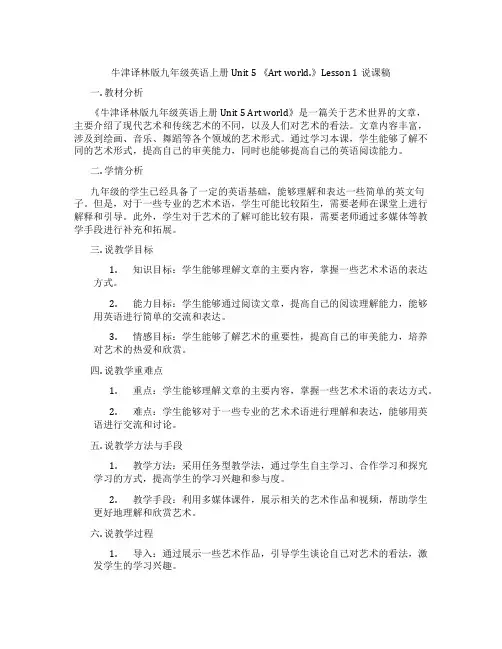
牛津译林版九年级英语上册 Unit 5 《Art world.》Lesson 1说课稿一. 教材分析《牛津译林版九年级英语上册 Unit 5 Art world》是一篇关于艺术世界的文章,主要介绍了现代艺术和传统艺术的不同,以及人们对艺术的看法。
文章内容丰富,涉及到绘画、音乐、舞蹈等各个领域的艺术形式。
通过学习本课,学生能够了解不同的艺术形式,提高自己的审美能力,同时也能够提高自己的英语阅读能力。
二. 学情分析九年级的学生已经具备了一定的英语基础,能够理解和表达一些简单的英文句子。
但是,对于一些专业的艺术术语,学生可能比较陌生,需要老师在课堂上进行解释和引导。
此外,学生对于艺术的了解可能比较有限,需要老师通过多媒体等教学手段进行补充和拓展。
三. 说教学目标1.知识目标:学生能够理解文章的主要内容,掌握一些艺术术语的表达方式。
2.能力目标:学生能够通过阅读文章,提高自己的阅读理解能力,能够用英语进行简单的交流和表达。
3.情感目标:学生能够了解艺术的重要性,提高自己的审美能力,培养对艺术的热爱和欣赏。
四. 说教学重难点1.重点:学生能够理解文章的主要内容,掌握一些艺术术语的表达方式。
2.难点:学生能够对于一些专业的艺术术语进行理解和表达,能够用英语进行交流和讨论。
五. 说教学方法与手段1.教学方法:采用任务型教学法,通过学生自主学习、合作学习和探究学习的方式,提高学生的学习兴趣和参与度。
2.教学手段:利用多媒体课件,展示相关的艺术作品和视频,帮助学生更好地理解和欣赏艺术。
六. 说教学过程1.导入:通过展示一些艺术作品,引导学生谈论自己对艺术的看法,激发学生的学习兴趣。
2.阅读理解:学生自主阅读文章,回答相关问题,老师进行讲解和引导。
3.艺术欣赏:学生通过多媒体课件,欣赏各种艺术形式的作品,提高自己的审美能力。
4.小组讨论:学生分组讨论文章中的艺术术语,老师进行指导和解释。
5.语言运用:学生通过角色扮演、小组讨论等方式,用英语进行艺术的表达和交流。
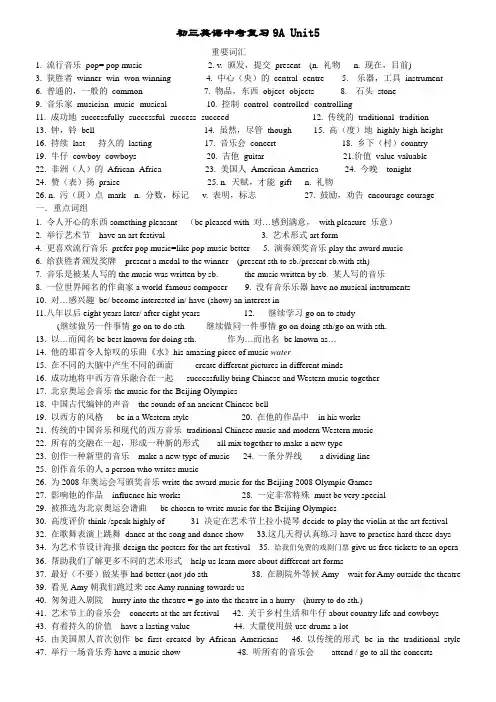
初三英语中考复习9A Unit5重要词汇1. 流行音乐pop= pop music2. v. 颁发,提交present (n. 礼物n. 现在,目前)3. 获胜者winner- win- won-winning4. 中心(央)的central- centre5. 乐器,工具instrument6. 普通的,一般的common7. 物品,东西object- objects8. 石头stone9. 音乐家musician- music- musical 10. 控制control- controlled- controlling11. 成功地successfully- successful- success- succeed 12. 传统的traditional- tradition13. 钟,铃bell 14. 虽然,尽管though 15. 高(度)地highly-high-height 16. 持续last 持久的lasting 17. 音乐会concert 18. 乡下(村)country19. 牛仔cowboy- cowboys 20. 吉他guitar 21.价值value-valuable22. 非洲(人)的African- Africa 23. 美国人American-America 24. 今晚tonight24. 赞(表)扬praise 25. n. 天赋,才能gift n. 礼物26. n. 污(斑)点mark n. 分数,标记v. 表明,标志27. 鼓励,劝告encourage-courage 一.重点词组1. 令人开心的东西something pleasant (be pleased with 对…感到满意,with pleasure 乐意)2. 举行艺术节have an art festival3. 艺术形式art form4. 更喜欢流行音乐prefer pop music=like pop music better5. 演奏颁奖音乐play the award music6. 给获胜者颁发奖牌present a medal to the winner (present sth to sb./present sb.with sth)7. 音乐是被某人写的the music was written by sb. the music written by sb. 某人写的音乐8. 一位世界闻名的作曲家a world-famous composer 9. 没有音乐乐器have no musical instruments10. 对…感兴趣be/ become interested in/ have (show) an interest in11.八年以后eight years later/ after eight years 12. 继续学习go on to study(继续做另一件事情go on to do sth 继续做同一件事情go on doing sth/go on with sth.13. 以…而闻名be best known for doing sth. 作为…而出名be known as…14. 他的那首令人惊叹的乐曲《水》his amazing piece of music water15. 在不同的大脑中产生不同的画面create different pictures in different minds16. 成功地将中西方音乐融合在一起successfully bring Chinese and Western music together17. 北京奥运会音乐the music for the Beijing Olympics18. 中国古代编钟的声音the sounds of an ancient Chinese bell19. 以西方的风格be in a Western style 20. 在他的作品中in his works21. 传统的中国音乐和现代的西方音乐traditional Chinese music and modern Western music22. 所有的交融在一起,形成一种新的形式all mix together to make a new type23. 创作一种新型的音乐make a new type of music 24. 一条分界线 a dividing line25. 创作音乐的人a person who writes music26. 为2008年奥运会写颁奖音乐write the award music for the Beijing 2008 Olympic Games27. 影响他的作品influence his works 28. 一定非常特殊must be very special29. 被推选为北京奥运会谱曲be chosen to write music for the Beijing Olympics30. 高度评价think /speak highly of 31 决定在艺术节上拉小提琴decide to play the violin at the art festival 32. 在歌舞表演上跳舞dance at the song and dance show 33.这几天得认真练习have to practise hard these days 34. 为艺术节设计海报design the posters for the art festival 35. 给我们免费的戏剧门票give us free tickets to an opera36. 帮助我们了解更多不同的艺术形式help us learn more about different art forms37. 最好(不要)做某事had better (not )do sth 38. 在剧院外等候Amy wait for Amy outside the theatre39. 看见Amy朝我们跑过来see Amy running towards us40. 匆匆进入剧院hurry into the theatre = go into the theatre in a hurry (hurry to do sth.)41. 艺术节上的音乐会concerts at the art festival 42. 关于乡村生活和牛仔about country life and cowboys 43. 有着持久的价值have a lasting value 44. 大量使用鼓use drums a lot45. 由美国黑人首次创作be first created by African Americans 46. 以传统的形式be in the traditional style 47. 举行一场音乐秀have a music show 48. 听所有的音乐会attend / go to all the concerts49. 民间、乡村音乐、爵士乐、摇滚、古典音乐会the folk/ country music/ jazz/ rock/ classical music concert50. 在剧院门口碰头meet at the gate of the theatre 51. have few close friends. 几乎没有亲近的朋友52. 我最喜欢的艺术形式the art form I like best 53. 表扬我的艺术节设计praise my designs for the art festival 54. 有真的绘画天赋have a real gift for painting 55. 把水和颜料混合mix the paint with water56. 像平时一样在艺术课上玩一些颜料play with some paint as usual in an art lesson57. 走到我的桌旁come by my desk 58. 鼓励我继续努力encourage me to keep trying59. 痴迷于画笔和颜料be crazy about crayons and paints二.重点句型1. 因为我发现了比艺术更令人愉快的东西。
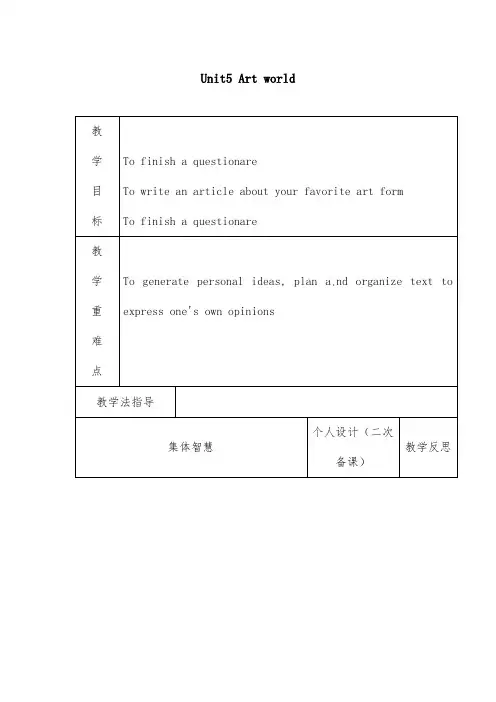
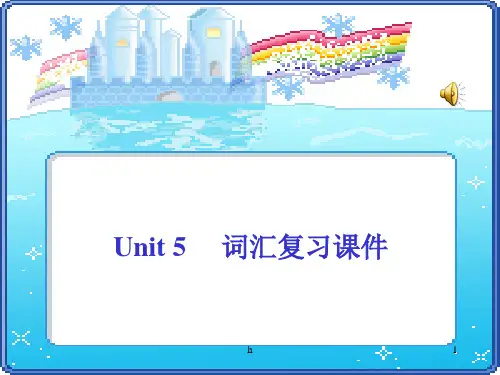
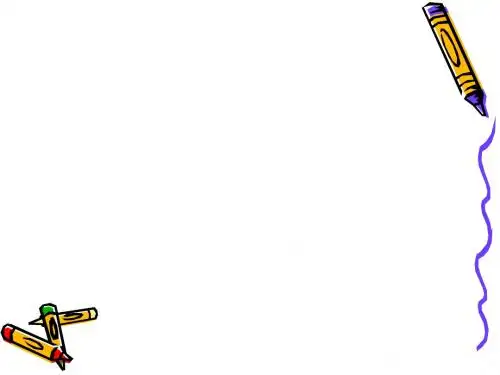
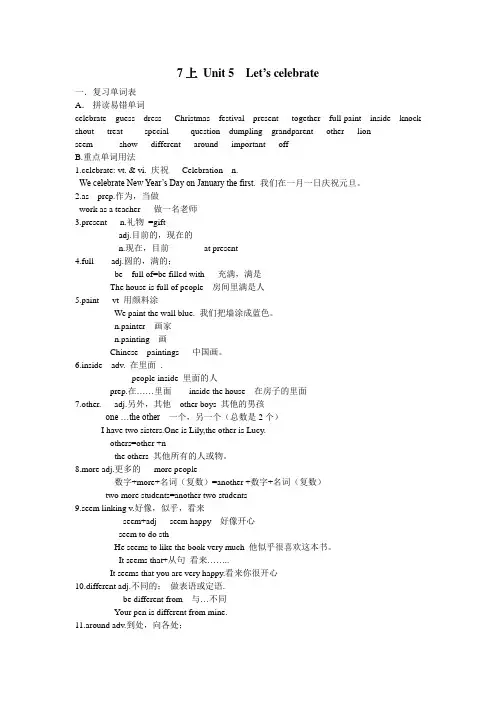
7上Unit 5 Let’s celebrate一.复习单词表A.拼读易错单词celebrate guess dress Christmas festival present together full paint inside knock shout treat special question dumpling grandparent other lionseem show different around important offB.重点单词用法1.celebrate: vt. & vi. 庆祝Celebration n.We celebrate New Year‟s Day on January the first. 我们在一月一日庆祝元旦。
2.as prep.作为,当做work as a teacher 做一名老师3.present n.礼物=giftadj.目前的,现在的n.现在,目前at present4.full adj.圆的,满的;be full of=be filled with 充满,满是The house is full of people 房间里满是人5.paint vt 用颜料涂We paint the wall blue. 我们把墙涂成蓝色。
n.painter 画家n.painting 画Chinese paintings 中国画。
6.inside adv. 在里面.people inside 里面的人prep.在……里面inside the house 在房子的里面7.other. adj.另外,其他other boys 其他的男孩one …the other 一个,另一个(总数是2个)I have two sisters.One is Lily,the other is Lucy.others=other +nthe others 其他所有的人或物。
8.more adj.更多的more people数字+more+名词(复数)=another +数字+名词(复数)two more students=another two students9.seem linking v.好像,似乎,看来seem+adj seem happy 好像开心seem to do sthHe seems to like the book very much 他似乎很喜欢这本书。
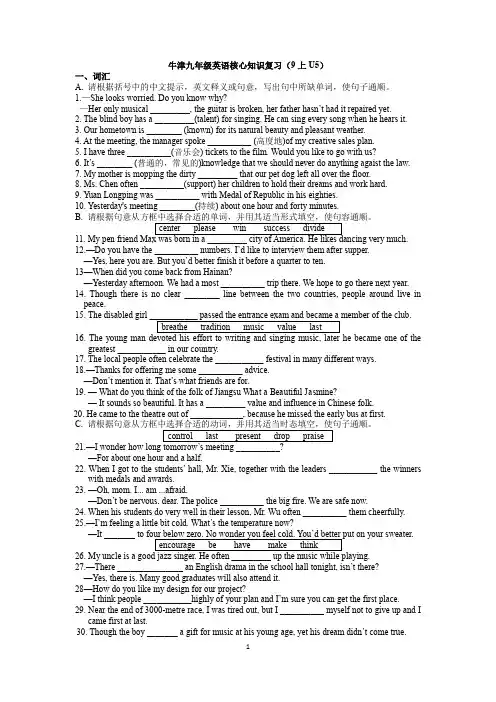
牛津九年级英语核心知识复习(9上U5)一、词汇A. 请根据括号中的中文提示,英文释义或句意,写出句中所缺单词,使句子通顺。
1.—She looks worried. Do you know why?—Her only musical _________, the guitar is broken, her father hasn’t had it repaired yet.2. The blind boy has a _________(talent) for singing. He can sing every song when he hears it.3. Our hometown is ________ (known) for its natural beauty and pleasant weather.4. At the meeting, the manager spoke __________ (高度地)of my creative sales plan.5. I have three __________(音乐会) tickets to the film. Would you like to go with us?6. It’s ________ (普通的,常见的)knowledge that we should never do anything agaist the law.7. My mother is mopping the dirty _________ that our pet dog left all over the floor.8. Ms. Chen often __________(support) her children to hold their dreams and work hard.9. Yuan Longping was __________ with Medal of Republic in his eighties.10. Yesterday's meeting ________(持续) about one hour and forty minutes.B.12.—Do you have the __________ numbers. I’d like to interview them after supper.—Yes, here you are. But you’d better finish it before a quarter to ten.13—When did you come back from Hainan?—Yesterday afternoon. We had a most __________ trip there. We hope to go there next year. 14. Though there is no clear ________ line between the two countries, people around live inpeace.greatest ___________ in our country.17. The local people often celebrate the ___________ festival in many different ways.18.—Thanks for offering me some __________ advice.—Don’t mention it. That’s what friends are for.19. — What do you think of the folk of Jiangsu What a Beautiful Jasmine?— It sounds so beautiful. It has a _________ value and influence in Chinese folk.20. He came to the theatre out of ____________, because he missed the early bus at first.C.21.——For about one hour and a half.22. When I got to the students’ hall, Mr. Xie, together with the leaders ___________ the winnerswith medals and awards.23. —Oh, mom. I... am ...afraid.—Don’t be nervous, dear. The police __________ the big fire. We are safe now.24. When his students do very well in their lesson, Mr. Wu often __________ them cheerfully.25.—I’m feeling a little bit cold. What’s the temperature now?—27.—There _______________ an English drama in the school hall tonight, isn’t there?—Yes, there is. Many good graduates will also attend it.28—How do you like my design for our project?—I think people ___________highly of your plan and I’m sure you can get the first place. 29. Near the end of 3000-metre race, I was tired out, but I __________ myself not to give up and Icame first at last.30. Though the boy _______ a gift for music at his young age, yet his dream didn’t come true.二、句型转换1. We saw Amy running towards us with a little drum in her hand. (改为被动语态)Amy _______ seen ________ towards us with a little drum in her hand.2. My grandmother praises me for my musical talent. (保持句意基本不变)My grandmother spoke _______ ________ me for my musical talent.3. Sandy made a very interesting picture with some paint onto the paper. (改为感叹句)________ _________ interesting picture Sandy made with some paint onto the paper!4. Tan Dun makes over 50 sounds from water by controlling the speed of water flow.(对划线部分提问) _________ _________ Tan Dun make over 50 sounds from water?5. My father got to know the famous writer 10 years ago. (保持句意基本不变)My father _______ ________ the famous writer since 10 years ago牛津九年级英语核心知识复习(9上U6)一、词汇A. 请根据括号中的中文提示,英文释义或句意,写出句中所缺单词,使句子通顺。
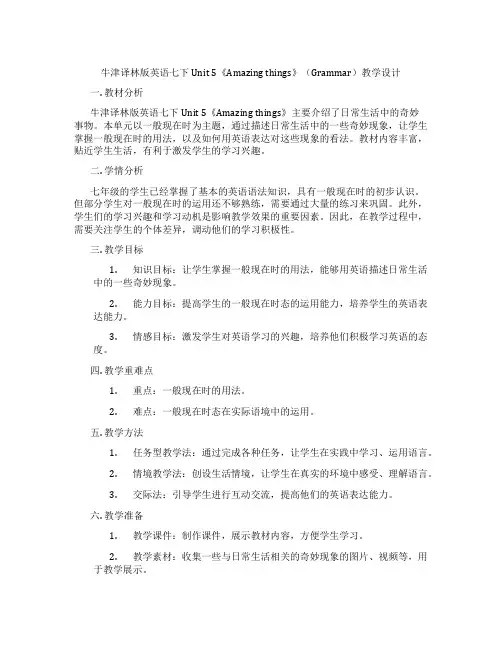
牛津译林版英语七下Unit 5《Amazing things》(Grammar)教学设计一. 教材分析牛津译林版英语七下Unit 5《Amazing things》主要介绍了日常生活中的奇妙事物。
本单元以一般现在时为主题,通过描述日常生活中的一些奇妙现象,让学生掌握一般现在时的用法,以及如何用英语表达对这些现象的看法。
教材内容丰富,贴近学生生活,有利于激发学生的学习兴趣。
二. 学情分析七年级的学生已经掌握了基本的英语语法知识,具有一般现在时的初步认识。
但部分学生对一般现在时的运用还不够熟练,需要通过大量的练习来巩固。
此外,学生们的学习兴趣和学习动机是影响教学效果的重要因素。
因此,在教学过程中,需要关注学生的个体差异,调动他们的学习积极性。
三. 教学目标1.知识目标:让学生掌握一般现在时的用法,能够用英语描述日常生活中的一些奇妙现象。
2.能力目标:提高学生的一般现在时态的运用能力,培养学生的英语表达能力。
3.情感目标:激发学生对英语学习的兴趣,培养他们积极学习英语的态度。
四. 教学重难点1.重点:一般现在时的用法。
2.难点:一般现在时态在实际语境中的运用。
五. 教学方法1.任务型教学法:通过完成各种任务,让学生在实践中学习、运用语言。
2.情境教学法:创设生活情境,让学生在真实的环境中感受、理解语言。
3.交际法:引导学生进行互动交流,提高他们的英语表达能力。
六. 教学准备1.教学课件:制作课件,展示教材内容,方便学生学习。
2.教学素材:收集一些与日常生活相关的奇妙现象的图片、视频等,用于教学展示。
3.练习题:准备一些练习题,用于巩固所学知识。
七. 教学过程1.导入(5分钟)利用课件展示一些奇妙的日常现象,如彩虹、日出等,引导学生关注本节课的主题。
然后用提问的方式引入一般现在时,让学生思考如何用英语描述这些现象。
2.呈现(10分钟)讲解一般现在时的概念,并通过示例让学生理解一般现在时的用法。
示例:描述日常生活中的习惯动作,如“I get up at 7 o’clock every morning.”。
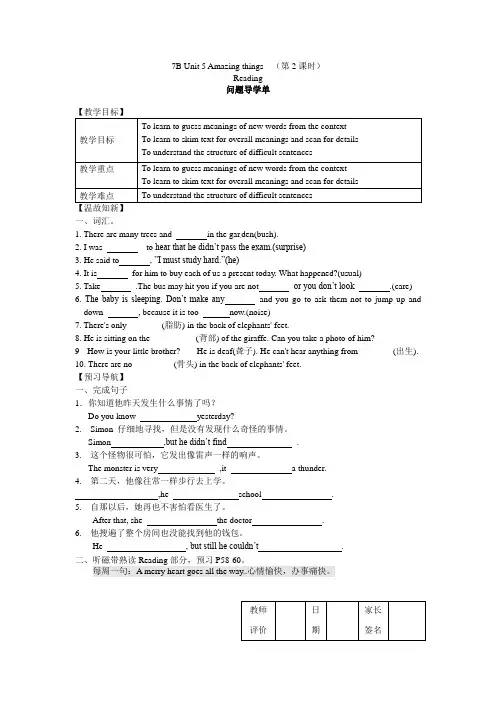
7B Unit 5 Amazing things (第2课时)Reading问题导学单教学目标To learn to guess meanings of new words from the context To learn to skim text for overall meanings and scan for details To understand the structure of difficult sentences教学重点To learn to guess meanings of new words from the contextTo learn to skim text for overall meanings and scan for details教学难点To understand the structure of difficult sentences【温故知新】一、词汇。
1. There are many trees and in the garden(bush).2. I was to hear that he didn’t pass the exam.(surprise)3. He said to , ”I must study hard.”(he)4. It is for him to buy each of us a present today. What happened?(usual)5. Take .The bus may hit you if you are not or you don’t look .(care)6. The baby is sleeping. Don’t make any and you go to ask them not to jump up and down , because it is too now.(noise)7. There's only _______ (脂肪) in the back of elephants' feet.8. He is sitting on the__________ (背部) of the giraffe. Can you take a photo of him?9 --How is your little brother? -- He is deaf(聋子). He can't hear anything from _______ (出生).10. There are no_________ (骨头) in the back of elephants' feet.【预习导航】一、完成句子1.你知道他昨天发生什么事情了吗?Do you know yesterday?2. Simon 仔细地寻找,但是没有发现什么奇怪的事情。
沪教牛津版初中英语九年级下册Unit 5知识点梳理Unit5课文Skiing: An unforgettable experience滑雪:一次难忘的经历by Vanessa作者:瓦内萨Last year, my parents took me on a very special holiday.去年,我的父母带我度过了一个非常难忘的假日。
My dream was to see some real snow, so during the Christmas holiday, we took our passports and flew over the Pacific to Calgary, Canada. We took a bus to a ski resort in the Canadian Rockies. As the bus climbed through the mountains, we saw the thick snow on the trees. I was dying to get out and play with it! At last, we reached the resort and quickly jumped out of the bus. This was our first experience with snow. We were like little children - we made snowballs, and threw them at one another! Then we checked in at the hotel. We could see the ski slope opposite the hotel. We could not wait to get out and ski.我的梦想就是能够亲眼看见真正的雪。
于是,在圣诞节期间,我们带上护照,飞过太平洋,来到加拿大的卡尔加里。
用心 爱心 专心 1 安徽省马鞍山市金瑞初级中学七年级英语《7BUnit5Vocabulary》教案 牛津版
课题 7B Unit5 Vocabulary
教学目标 知识目标 1Talk about qualities about friends. 2Learn about some new words and phrases. 3Get to know something about qualities of a good friend 能力目标 Learn some adjs. about characters & their opposites.
情感目标 1To educate the students to be polite and helpful to others. 2To arouse the ideas of helping others and caring for each in our daily life.
教学重难点 1Talk about qualities about friends.
2 Learn some adjs. about characters & their opposites. 教学方法 Asking and answering, practicing, pair work , group work
教学辅助 PPT, Preview exercises, pictures, Class job
教学过程 Step 1 Checking the Preview exercises Check the Preview exercises in each group. Step 2 Showing the teaching aims Show the learning aims of this lesson, giving the introduction simply. Step 3 Show students the Guiding material 1Revise the text of reading (describe the story) 2 Try to use the suitable adjs. to describe Zhang Hua’s qualities by asking questions. 1) When was the fire? 2) How did Zhang Hua save his neighbour? 3) Did he do anything to keep himself safe? What did he do? 4) Was he afraid at that moment? 5) What do you think of Zhang Hua? Step 4 Presentations 1. lead in Try to use the following adjectives to describe the people around you. 乐于助人的 helpful 勇敢的 brave 友善的 kind 细心的 careful 有礼貌的 polite 感激的 grateful 快的 quick 开心的 happy (Have a discussion if necessary.) 2. Find the opposites of the words above. Then check the answers together. Keys: 1—e 2—d 3— f 4—g 5—c 6—b 7—a 8—h 3. Ask the students to read the passage quickly and fill in the blanks with the opposites of the given words. Keys: kind, helpful, polite, careful, quick, brave, grateful, happy 用心 爱心 专心 2
牛津英语7B Unit5 九年级复习教学案 一:必须背熟的重要词组: 1.有不同的能力_have different ablitities 一个能干的人an able person 2. 授予某人奖项give sb an award 推荐某人获奖 recommend sb for an award 获得勇敢奖 get an award for bravery 本年度最佳青年奖 this year’s Youth Award 七年级最乐于助人奖 the Grade 7 Most Helpful Student Award 七年级最佳女运动员奖the Grade 7 Best Sportswoman Award 3. the +adj. 表示一类人或事物(做主语时动词用复数) 老人the old/ the elderly 年轻人the young 有钱人the rich 穷人the poor the clever聪明的人 拜访老年之家visit a home for the elderly 为老年人表演戏剧 have a drama a show for the elderly 4. 玩火 play with fire 灭火 put out the fire 着火be on fire/ catch fire 小心用火be careful with fire 把某人从火中救出help /save sb out of fire 5. save ⑴ 救那些处于危险中的人.save the people in danger ⑵ 节约 节约用水save water 省钱 save money adj. safe (反)____dangerous n. safety (反)_____danger 6. 把…..泼在…..上 pour sth over 7. keep 保持 使某人的生命远离危险 keep one’s life away from danger 让长发远离火 keep long hair away from fire 把手一直放在背后keep one’s hands behind the back 眼睛一直睁着keep one’s eyes open 让某人一直做某事keep sb doing 阻止某人做某事 keep/ stop/prevent sb from doing 很抱歉让你等这么久. I’m sorry to keep you waiting for such a long time/so long Something must be done to keep the traffic accdient from happening. 8.对某人感到感谢be grateful to sb 对某事感到感激be grateful/thankful to sb for sth 9. 在----方面有好的成绩have good grades in…. 10. 很好的组织班级活动 organize class activities well 11在去某地的路上on one’s way to sp 在他去上学/ 电影院/ 回家的路上on his way to school/to the cinema/ home 在去游泳的路上 on the way to swim 12.清理公园clean up the park 13. 给某人让座give sb a seat 二:必须背熟的重要句子: 1.Some organizations give awards to people for the things they do.有些组织机构为那些做事的人给予奖励。 2.Wand Fang quickly ran back to her flat and poured water over her jacket王芳汛速跑回到公寓并把水泼在毯子上 3.She put out the fire with a blanket and helped Mr Sun out.她用毯子把火扑灭并帮孙先生出去 4.Fire can be dangerous It is important to be careful with fire. It’s possible for fire to cause danger if we are not careful.火可能很危险,小心用火很重要。如果我们不小心火可能引起危险 5.Did you do anything for your own safety?你为自己的危险做了一些事情了吗? 6.Fire safety:(用火安全 )①Be careful with matches ②Do not leave the stove on. ③Do not put anything hot into the rubbish bin ④keep long hair away from fire ①.小心使用火柴 ②别把火炉开着 ③别把热的东西放进垃圾箱④别让长头发靠火炉 7.I would like to recommend Chen Dan for the Grade 7 Most Helpful Student Award because he is kind, brave, helpful and polite 我想推荐陈丹为七年级最乐于助人奖,因为他善良,勇敢,乐于助人且有礼貌。 8.It’s snowing in Canada, We can go skiing there.加拿大在下雪,我们可以去那儿滑雪 9. Mr Sun could not get out because he hurt his leg.孙先生不能出去,因为他的腿受了伤。 10. I don’t play basketball very often. I’m sure that I”ll lose the game within 10 minutes.我不能经常打篮球。我肯定我在10分钟内会输掉球 11.We look forward to hearing from you soon.我盼望着收到你的来信。 三:重要知识点; 1.think of …. 想起….. 他总是先考虑别人. He always thinks of others first 比起自己来他更多的考虑别人.He thinks more of others than of himself. 2. 她经常告诉小一点的学生进行水上运动时要小心. She often tells younger students to be careful when they play water sports 3. within 在….之内 去年我等了好几个小时才钓到一条鱼.但可能今年我会在5分钟内钓到一条鱼. Last year, I caught a fish afterwaiting for many hours,but maybe I’ll catch a fish within five minutes. 我肯定我会在十分钟内输掉这场比赛. I’m sure that I’ll lose the game within ten minutes. 4. do A instead of doing B 如果你想看看世界各地的名胜,你可以去世界公园而不用去周游世界。 If you want to take a look at places of interest all over the world,you can go to the World Park instead of traveling around the world. 5. 奶奶年纪大了但记性很好. Grandma is old but shehas a good memory 6. 你应该更经常读英语用英语. You should read English more often and use English more often. 7. 尽力做某事 do/try one’s best to do sth 如果她尽力的话,她在地理方面会取得更好的结果. She can get better results in geography if she does her best. 8. 我想她明年能进入校队. I think she can get into the school team next year. 9. 说出中小学间的区别. Tell the differences betwwen secondary schools and primary schools 10. 陈丹考虑问题很周到工作时很认真. Chen Dan is thoughtful and thinks carefully when he works. 11 可能的 _possible 不可能的 impossible_ It’s (highly) possible (for sb.) to do sth. It’s possible that …… Eg. It’s highly possible for humans to live on Mars in the future It’s possible that he will leave tomorrow. 14. There’s only a small chance that I will not play. 15. likely ---more likely---most likely It’s likely that……. Eg. It’s likely that he might be here tomorrow morning.